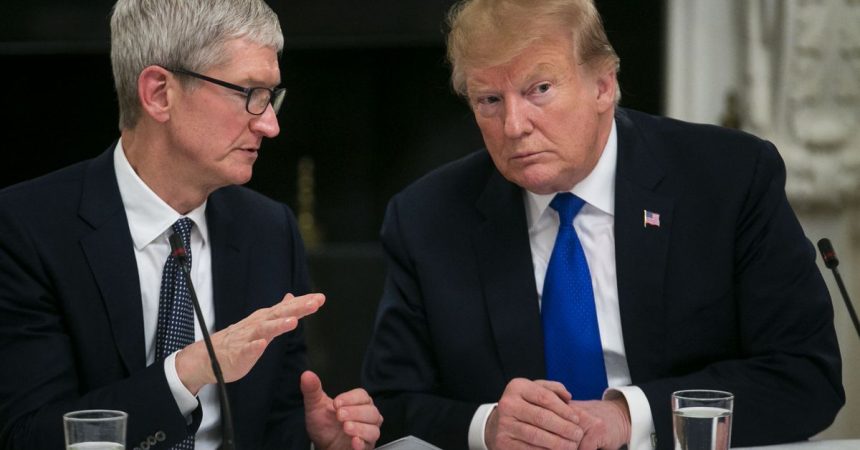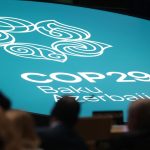The impending dinner meeting between Apple CEO Tim Cook and President-elect Donald Trump at Mar-a-Lago signifies a crucial juncture in the evolving relationship between the tech giant and the incoming administration. This marks Cook’s first known interaction with Trump since the election, building upon a previously established direct line of communication fostered during Trump’s first term. This connection, envied by other tech CEOs, underscores Apple’s strategic positioning within the political landscape. The upcoming meeting provides a platform for Cook to address critical issues that could significantly impact Apple’s operations, including potential tariffs and the ongoing antitrust scrutiny from the European Union. The timing of this meeting, following Trump’s conversations with other tech leaders like Google’s Sundar Pichai and preceding a scheduled meeting with Amazon’s Jeff Bezos, highlights the significance of the tech industry’s engagement with the new administration. This concerted effort by tech giants to establish rapport with the incoming president suggests a proactive approach to navigating potential policy changes and regulatory challenges in the coming years.
The backdrop of this meeting is complex, colored by Trump’s previous pronouncements on Apple and the broader tech industry. His campaign trail claim of Cook personally calling him to complain about EU fines related to anticompetitive App Store practices adds a layer of intrigue to the discussions. This assertion, if true, underscores the potential impact of international regulatory actions on Apple’s business and its willingness to engage with the US government for support. Cook’s likely agenda includes navigating the intricate web of potential tariffs, which could significantly affect Apple’s manufacturing and supply chain, particularly given its reliance on overseas production. The EU’s investigations into Apple’s App Store policies and platform management, encompassing both the iPhone and Mac ecosystems, represent another significant area of concern for Apple. These regulatory hurdles pose substantial financial and operational risks, making them a priority for Cook’s discussions with the President-elect.
The broader context of this meeting highlights the intricate dance between the tech industry and the political arena. Trump’s engagement with leading tech figures like Cook, Pichai, Bezos, and Zuckerberg, coupled with Meta, Amazon, and OpenAI’s substantial donations to his inauguration fund, paints a picture of mutual courtship and strategic maneuvering. Tech companies are clearly seeking to influence the incoming administration’s policies and regulatory approaches, while Trump benefits from both financial support and the symbolic endorsement of industry leaders. This interplay underscores the increasing importance of technology in shaping economic and political landscapes, as well as the growing recognition of this influence by both the tech sector and political leaders.
Cook’s meeting with Trump signifies more than just a courtesy call; it represents a strategic imperative for Apple to navigate the potentially turbulent waters of the new administration’s policies. Tariffs, a key concern for Apple’s global supply chain, could disrupt production, increase costs, and impact profitability. The ongoing antitrust scrutiny in the EU poses an existential threat to Apple’s control over its App Store ecosystem, a crucial revenue stream and a defining feature of its platform strategy. By engaging directly with Trump, Cook aims to articulate Apple’s perspective on these critical issues, seeking to mitigate potential negative impacts and secure a favorable regulatory environment. This meeting underscores the importance of direct communication and relationship-building in navigating the complex intersection of business and politics.
The timing of this meeting, in the wake of engagements with other tech leaders, suggests a coordinated effort by the industry to engage with the incoming administration early and proactively. This concerted approach signifies the tech industry’s recognition of the potential impact of the new administration’s policies on their businesses. By establishing direct lines of communication and building rapport with key figures in the administration, tech companies aim to influence policy decisions and shape regulatory frameworks in ways that are conducive to their growth and innovation. The substantial donations to Trump’s inauguration fund further underscore this strategic maneuvering, indicating a willingness to invest in building relationships and accessing influence within the new power structure.
In conclusion, Cook’s meeting with Trump represents a pivotal moment for Apple and the broader tech industry. It signifies the importance of navigating the political landscape, building relationships with key decision-makers, and proactively addressing potential challenges posed by new policies and regulations. The discussions surrounding tariffs, EU antitrust scrutiny, and other potential policy changes will have far-reaching implications for Apple’s business and the tech industry as a whole. This meeting underscores the increasing interdependence between technology and politics, and the need for ongoing dialogue and engagement to ensure a regulatory environment that fosters innovation and economic growth. The outcome of this meeting, and the subsequent actions taken by both Apple and the Trump administration, will significantly shape the future trajectory of the tech industry.



